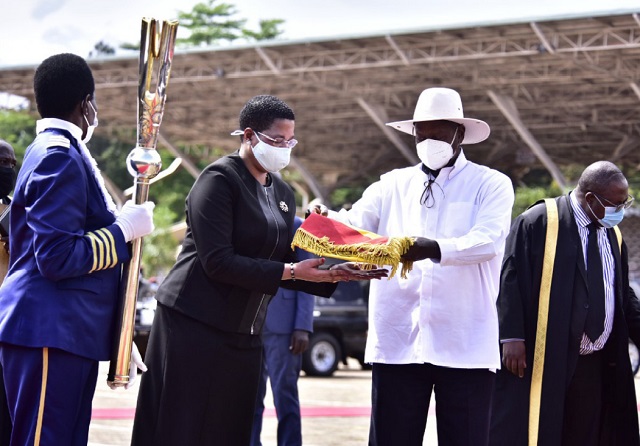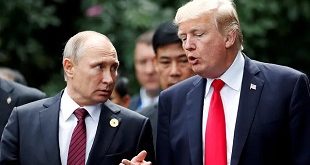
Opposition wants constitution amendment to reduce President’s power
Kampala, Uganda | MUBATSI ASINJA HABATI | The recent election of Anita Among as Speaker and Thomas Tayebwa as deputy Speaker of the 11th parliament following the death of Jacob Oulanyah once again allowed President Yoweri Museveni to show off his firm hold on power.
Both Among and Tayebwa were Museveni’s choice which he sold to members of his ruling National Resistance Movement (NRM) party central executive committee and later to the NRM legislators. All other contenders to the position of Speaker and Deputy Speaker from within the NRM Members of Parliament; including three ministers, had no choice but to accept the decision of the party chairman and get out the race.
Political observers have note over time how no key office appointment or assumption takes place in Uganda without the approval of President Museveni.
“The recent election of the Speaker of Parliament and deputy speaker has illustrated how very powerful Museveni is,” says one observer.
And the immense power he wields is not all completely of Museveni’s making. The constitution vests the powers of appointing people in key offices in the president. He appoints the chief justice, deputy chief justice, Inspector General of Government and deputies.
He appoints ministers, Director General of Uganda Revenue Authority, Inspector General of Police and deputy, the Commissioner General of Prisons, governor Bank of Uganda, Permanent Secretaries of various ministries, the army commander and other commanders, the chairman of the Electoral Commission and the commissioners, the chairperson of Uganda Human Rights Commission and commissioners, Resident District Commissioners, etc.
Appointments of some of these officers are subject to parliamentary approval but Museveni’s stranglehold on power has meant the approval process is just a formality. Most of the presidential appointees are always approved with a few exceptions.
Some commentators, especially opposition politicians, are growing concerned about the immense power Museveni holds and wields.
“We don’t want a scenario where Museveni becomes the law himself. He now has firm control of the judiciary, parliament and other institutions,” says Joel Ssenyonyi, Nakawa West MP and spokesperson of the opposition political party, National Unity Platform (NUP).
Devolution of power
During the 2011 general elections campaigns one of the presidential candidates, Beti Olive Namisango Kamya, campaigned on the platform to review the powers that the constitution bestows on the presidency.
At the time, Beti Kamya was the president of the Uganda Federal Alliance. She argued that the introduction of a federal style of government would help in sharing political power and make the President more democratic and accountable.
Kamya even collected signatures with the aim of compelling the Electoral Commission to hold a referendum to change the constitution and reduce the powers of the President. But somehow this was nipped in the bud, when Kamya abandoned her UFA party and accepted a ministerial post in Museveni’s government. Kamya is now the IGG having been dropped from the cabinet. When President Museveni recently revealed that he had been following Beti Kamya’s writings in the newspapers, many wondered if he appointed her into his government to silence her.
Previously, Beti Kamya had argued: “I want Ugandans to consider this country like a sick person but the origin of your sickness could have been a boil which turned into a wound, which turned into a fever, which fever brought vomiting and dehydration. All those opportunistic diseases caused by the original wound should be treated but the original cause of fever could have been a wound. If you don’t deal with that original wound, you will never get well. That’s how Uganda is like. Restoration of term limits and fighting corruption and remodeling the EC are opportunistic diseases. The real problem is concentration of power in one place. We need to deal with the constitution.”
Situation elsewhere
In the neighbouring Kenya, they made a new constitution, which has been running for the last five years. In that new constitution, the Kenyans now have a deputy president who is elected alongside the president (head of state). Not under any circumstances can the deputy president be sacked or appointed by the head of state.
The chief justice of Kenya is formally appointed by the president after having gone through a competitive process manned by the judicial service commission. Before the enactment of Kenya’s 2010 Constitution, the president appointed the chief justice without any interview process or parliamentary approval.
The chief justice did not enjoy security of tenure, and could be dismissed at the pleasure of the president. However, under the new Kenya Constitution, the chief justice is selected by the Judicial Service Commission after a competitive process involving a vacancy announcement, shortlisting of applicants and interviews.
In order to be appointed as the Chief Justice, a person must have at least 15-years’ experience as a legal practitioner. At the end of the interviews, the Judicial Service Commission selects one individual whose name is forwarded to Parliament for vetting and approval. If Parliament gives the candidate the green light, he is then formally appointed by the President, says part of the current Constitution of Kenya.
In the United States of America Supreme Court justices, court of appeals judges, and district court judges are nominated by the President and confirmed by the United States Senate.
In Uganda, the President appoints justices and court judges. Time and again the judiciary has been appealing to the president to appoint all the required judges so that there is speedy delivery of justice. The president has snubbed them.
In a recent Constitutional Court ruling it was found that the independence of the country’s judiciary is in jeopardy because of the way the budget of this arm of government is handled. In one of its most significant decisions under the present constitution, the court said the system made the judiciary very much the junior branch in the three arms of government, and often reduced the Chief Justice ‘to pleading for funds from the executive’. The executive in most cases refers to the President and his cabinet.
The cabinet is appointed by the President. The president is the commander-in-chief, he appoints the vice president, prime minister, chief justice, ministers, permanent secretaries, judges, heads of commissions, etc.
“In Kenya, the President controls 20 per cent of the budget and he does not appoint central bank governor, judges and others. This is what we want,” says lawyer Isaac Ssemakadde , “In Uganda, when they appropriate money in our Parliament, 80 per cent remains in the hands of central government. That’s why there is no service delivery. This makes it hard to change leadership because of immense influence that the centre has. Presidential term limits are important but they can be manipulated.”
The constitutional court ruling noted that: “the Chief Justice has been reduced to begging for funds that would allow the courts and the justice system to function properly. Given the enormous power wielded by President Yoweri Museveni, it is often assumed that the judiciary is a mere rubber stamp for his decisions. This decision is an important step towards correcting or rehabilitating that public perception of the judiciary.”
Political observers think that reducing the powers of the president would increase the independence of institutions. Stronger independent institutions like parliament, the judiciary, police, etcetera, would be good for Uganda’s democracy.
****
 The Independent Uganda: You get the Truth we Pay the Price
The Independent Uganda: You get the Truth we Pay the Price




Ok. Mwebare okwoogera ensonga eyo. Naye nariyagadde ugandans okujukira ebyemabega, byetuyiseemu, weturi, jetulaga, twawule obwa president ku politics, mubutufu politics teyalibadde mbi naye waliwo kumpi ebitundu 90 opposition tebaagaliza uganda okukulakulana nokwegata, opposers fight for their tribs and their families, no matter ganagana and cosquences and homeless of ugandans come again, they don’t have heart of their nation. But president fought for all nation including you opposers, but now you want to command him how to rule ug. You use your own tricks to distroy UGANDA. But GOD can’t allow. SHUJAA YKMUSEVENI mumuleke simwe mwaamuleta, eyaamuleeta bwalyagala nti ugandans badde mumitawana, alimujako.